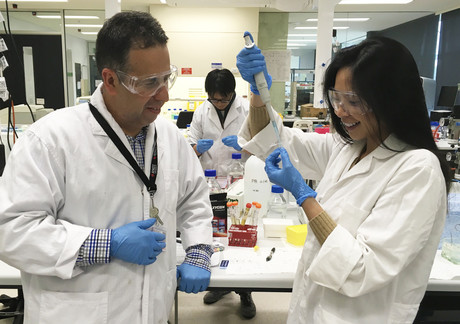Novel way of treating viral disease discovered
By Adam Florance
Tuesday, 18 July, 2017

Researchers have discovered a novel new way of treating viral diseases including HIV, dengue, rhinovirus and influenza, the last of which infects five million people annually with a death rate as high as 10%.
An international collaboration led by has identified a protein, Nox2 oxidase, that is activated by viruses in a biological process that dates back 1.5 billion years, affecting plants and fungi as well as mammals. This protein suppresses natural antiviral reactions, allowing the virus to take stronger hold in the host body.
Located in a cell compartment called endosomes, the researchers designed a prototype drug using a carefully modified chemical that inhibits the activity of the Nox2 oxidase protein. This customised drug has been highly effective at suppressing influenza infection in the laboratory.
RMIT senior author Dr Stavros Selemidis, an ARC Future Fellow, said: “Current treatment strategies are limited, as they specifically target circulating viruses and have either unknown or very little effect against new viruses that enter the human population. We have identified a protein of the immune system that contributes to the disease caused by flu viruses irrespective of their strain.”
More than 13,000 Australians are hospitalised due to severe influenza infections each year, resulting in over 3000 deaths.
First author Dr Eunice To said: “This work identifies a treatment strategy that has the potential to alleviate the symptoms caused by some of the most devastating viruses worldwide, including the flu.”
Having attracted considerable attention at the NADPH Oxidase GORDON conference in the USA last year, Professor Calum Drummond, RMIT Deputy Vice-Chancellor Research and Innovation, believes the research holds immense promise. “Dr Selemidis’ laboratory and his collaborators are pursuing further research to aid development of novel drugs for further trials and this is showing great potential,” he said.
Dr Selemidis, who is head of the Oxidant and Inflammation Biology Group within the Chronic Infectious and Inflammatory Diseases program at RMIT, said: “The strength of this work is the multidisciplinary approach taken and the degree of collaboration. It includes researchers and clinicians from eight universities across Australia, the United States and Ireland.”
The research has been published in .
Originally published
$12m for homegrown heart disease and diabetes innovations
$12 million in federal funding has been announced for the development of new Australian-made...
National cancer screening program marks first in almost 20 years
From 1 July, the National Lung Cancer Screening Program will commence — marking the first...
Doctor deregistered after botched facelift calls for ambulance
A Queensland doctor has been deregistered after a botched cosmetic surgery procedure left a...





